News
Winter has arrived: Thousands left at the mercy of winter in Greek hot-spots
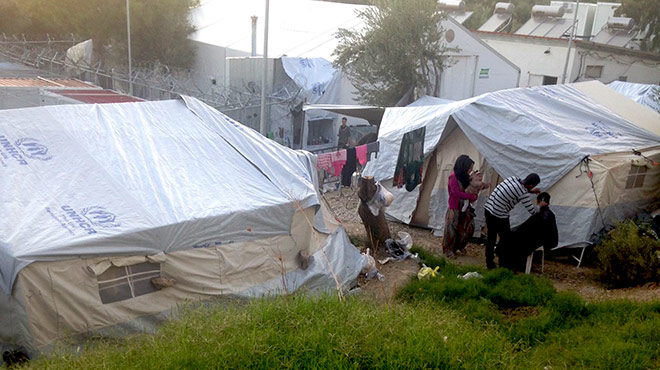
Despite repeated warnings thousands of refugees will be in danger as weather deteriorates. The Greek government has failed to react leaving people in Reception and Identification Centers (usually referred as RIC or otherwise the Hot-Spots) in the Aegean islands Lesvos, Samos, Chios, Kos and Leros unprotected under restriction of movement.
The geographical restriction policy, a key element of the EU-Turkey deal, keeps thousands trapped within overcrowded hot-spot facilities. People, even very vulnerable persons, like medical patients and families with newborns, have to wait there until the first hearing of their asylum case.
A spike of arrivals since August have exhausted resources and infrastructure of the reception facilities in most of the islands beyond their capacity. Conditions are inhumane and authorities are unable to cope. Within the last ten days the Government has decided to move up to 2.000 people to the mainland in order to ease the pressure. But given the proportions of the population and needs this initiative will hardly make a difference.
Last year five people perished during winter in the hot-spots. Thousands suffered for months in the cold and rain. Minister of Migration Giannis Mouzalas has responded to criticism by saying these deaths made us “wiser”.
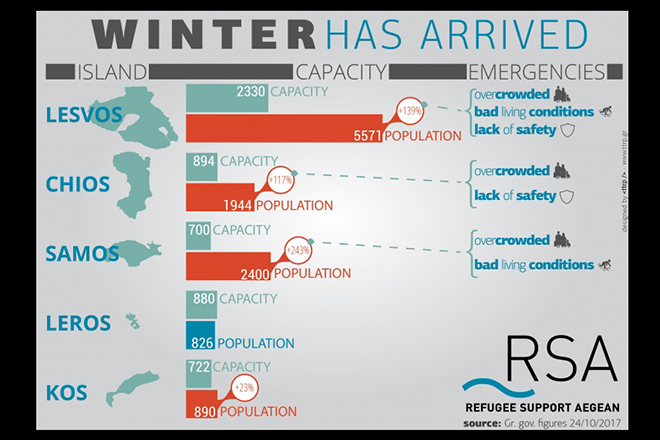
Winter has arrived again in the northeastern Aegean islands and heavy rain is turning the hot-spots into a quagmire. Mouzalas and the Greek government have learned nothing from last winter’s fiasco and they are set to repeat it. Also European authorities are indifferent to human suffering in the islands caused by the implementation of the EU-Turkey deal as long as they deliver the deterrent effect EU politicians considers an imperative.
Refugee Support Aegean, implementing partner of PRO ASYL in Greece, is providing a basic snapshot of the situation in the five hot-spots as the islands brace for winter.
Lesvos notoriously problematic hot-spot Moria with a capacity of 2.300 is currently hosting 5.570 people. The total number of refugees on the island is close to 7.300.
Accommodation infrastructure consists of 123 pre-fabricated houses, 100 family tents, 120 small summer tents (the number is growing everyday) 5 , and a number of makeshift shelters set up by organisations or refugees themselves. Very few NGOs are still operating inside Moria and limited Non-Food Items and clothes are provided. There is often a deficit of even basic provisions like milk-powder and diapers.
A large number of the refugee population in Moria are very young children and the number of minors on the island approaches 1.200. Families with young children, pregnant women, single women, and sick people are staying in small summer tents totally unprepared for winter. During the first rain in September the water entered the tents and refugees were caught in the mud.
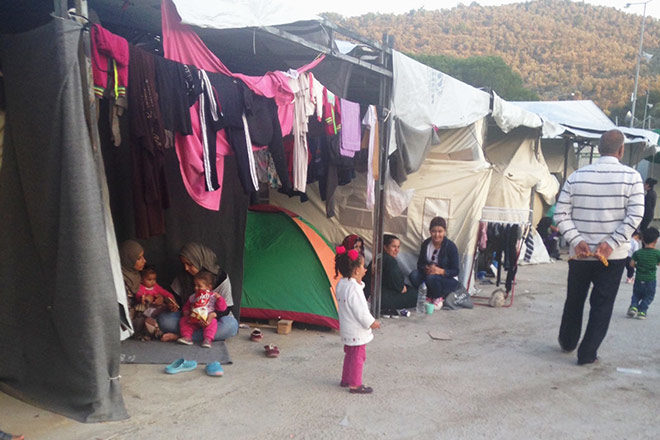
A 29 years old victim of torture from Congo arrived in Mytilini at the beginning of December 2016. During last winter a woman and a small child died in front of her eyes when a gas canister they used for cooking exploded inside their tent. The mother of the children and her brother survived with serious burns. She was still living in a tent when Moria was covered by snow last January and 3 refugees lost their lives by inhaling toxic fumes produced by garbage they burned to keep them warm during the night. Following these deaths she was transferred for a short period to a hotel in Thermi as many other Moria residents. After a month when the weather improved she was transferred back to Moria. Today she lives in a family sharing a few square meters with another 24 people. “Every time I open the door of the container I walk through small tents full of families with small children. They can’t reach the toilets so they enter our container to use the toilets”. “When it rains all families enter our container. They stand up all night as there is no place to sleep” she says concluding “I suffered so much in Moria. I waited so long to leave the island”.
The inhumane conditions and the lack of information about the procedures in general or initiatives from the authorities’ like the sudden lift of geographical limitations for selected numbers of people have also contributed to extreme tension in Moria that often result in violent incidents.
Medical response from Ministry of Health has improved during the last two months with 5 doctors and 16 nurses allocated in the hot-spot. Additionally 8 psychologists and 18 social workers work in shifts assisted by 3 cultural mediators and 1 epidemiologist.
The identification and registration centre in Vathy on Samos, has a capacity of 700 persons but currently hosts more than 2.400. It is located at a hillside at the rim of the city.
Today, refugees inside the hotspot still stay under deteriorating conditions while the majority is trying to survive in tents in the woods surrounding the facility. In the majority of cases newcomers are staying in these different kinds of tents and makeshift shelters. Lack of heating and protection from the cold and harsh weather conditions leaves them exposed. Some refugees are trying to prepare for the worsening weather conditions by collection wooden pallets to support their shelters. Among the refugees sleeping under these rough conditions are a significant number of families with children, pregnant women, unaccompanied minors, disabled people and people with serious medical issues. At the same time there is a serious unmet need for early identification and adequate medical and psychological care for these vulnerable groups.
The island rates third in number of arrivals in October. The main nationalities are Syrians, Iraqis and Afghans. The majority of them are families but nearly 100 unaccompanied minors live in the camp with more than 760 children in total, according to Samos Volunteers. Inside the hotspot hygiene is a huge problem as a consequence of the limited number of toilets and the regular water cuts.
The bad living conditions have increased tensions among the refugees in and around the hotspot. Dozens of minors hosted in one designated space have been reportedly dispersed across the camp after escaping violent attacks to avoid escalation and are now staying in prefabricated houses along with adults or in makeshift tents. Transfer of unaccompanied minors to special shelters in the mainland can take months of waiting. After the closure of the transit shelter for minors, which was run by Praksis until a month ago, only one more shelter exclusively for children under 15 years has remained open.
Especially, vulnerable persons, most of which are families with small children, have been offered shelter in flats run by ARSIS and Praksis in the city of Samos, but the local population has become less welcoming and flat owners are increasingly hesitant to provide shelter to refugees. In addition to the flats, MSF still hosts dozens of vulnerable refugees in a hotel in the city. While authorities try to decongest the hot-spot of Samos by removing the geographical restriction of a number of refugees and transfer them to the mainland, the announced schedule for the evacuation will possibly face delays.
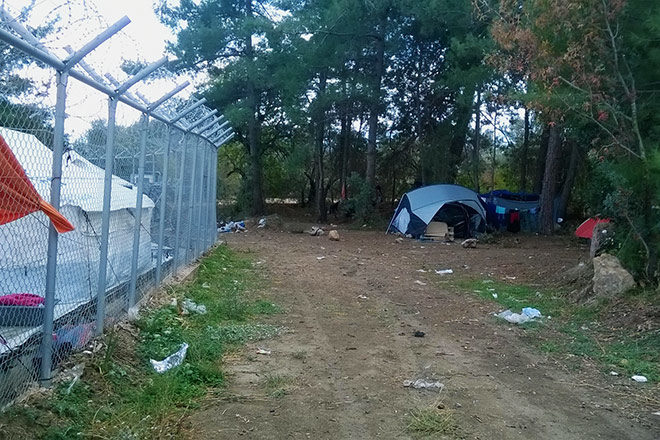
Chios Ρeception and Ιdentification Center “Hot-spot” VIAL is located 8 km from the center of the town Chios. The center is located in a deserted aluminum factory and half of it is still used as a waste separation and recovery centre. Under the present legal framework, VIAL is a closed facility for the registration and processing of the incoming refugees. VIAL now remains the basic accommodation center and has a total capacity of 894 persons but is currently hosting 1.944 persons. VIAL includes a registration area inside the building and two main outdoor accommodation areas, surrounded by a metal fence, topped with barbed wire. A total of 75 prefabricated houses of 30 to 40 square meters surface each, with only some beds or mattresses inside, are now home to a static population since the implementation of the EU – Turkey deal. Families or individuals are eating, sleeping, living in there for months and conditions do not meet the minimum shelter standards.
In both sections of accommodation there are prefabricated houses transformed to bathrooms and showers separated for men and women. Still the running water stops from 21 pm to 7 am every night. Lack of hot water and a constant feeling of insecurity are the usual complaints of the inhabitants. There is only one toilet, without effective access for people with physical disabilities in each section of the camp and no showers accessible for people in wheelchairs.
The closure of “Souda“, open refugee camp, together with the increase in arrivals since the beginning of September led to the extension of the camp. Thirty two new tents were put up in muddy fields. The plan is to replace these tents with prefabricated houses but the first rains have already started and the camp extension has no provision of electricity or other source of heating, and the chemical toilets are flooding.
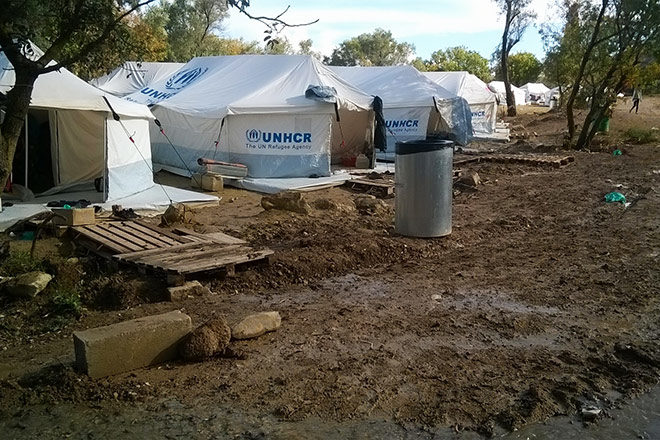
Recently the Minister of Migration took over services provided by NGOs. There are significant gaps regarding delivery of Non Food Items and basic medical provisions. NGO “SAMS” contributes with two doctors as there was no interest in a recent call from authorities to hire local doctors. There is also a team of nurses, a psychologist, social workers and cultural mediators. But the local hospital is overwhelmed with the referrals from the hotspot, and severely disabled or mentally ill people do not have access to proper psychological support and treatment.
People are in general psychologically exhausted and there are many cases of self-harming and even suicide attempts. “During the first rain that lasted only twenty minutes the walls and the floor of our prefabricated house started to fill with water. We complained to the authorities asking to repair the holes with silicone but they replied that there is no problem” said an Iraqi national living in Vial with his family.
According to the official data there are more than 890 refugees in the Reception and Identification Center of Kos with a capacity of just 722. The hot-spot is situated in the village of Pyli around 15 Kilometers away from the center of the city and consists of prefabricated houses. Next to the facility a pre-removal (detention) center opened last March with a capacity of 500 persons is now used for additional accommodation. For example dozens of refugees who arrived in Crete in September have been transferred there. In the middle of October the detention center hosted more than 140 persons, according to information from UNHCR. Refugees arriving in the islet Kastelorizo or other small islands near Kos, have been transferred to Kos because of lack of shelter in smaller islands.
The situation in Kos is challenging although it’s reportedly better than in the others islands. While the arrivals in the past were mainly single men from South Asia, currently there is a large number of families from Iraq and Syria. During October there was a lack of baby food and supplies. Local activists and the small NGO Flying Help provided milk and diapers to the authorities that seemed totally unprepared to take care of refugee families. Local activists are pointing out that there will be also a need for warm clothes as winter approaches. Reportedly some of the air-conditioners inside the prefabricated houses are not functioning due to damage or technical problems. Extremely vulnerable persons are currently inside the hot-spot. For example a cancer patient from Iraq with catheter who has been transferred by boat from Crete. In Kos RIC there are currently 3 doctors (2 from SAMS), 8 nurses, 7 psychologists, 5 social workers, 2 cultural mediators from KEELPNO to support the population.
At the beginning of the summer conditions in Leros hot-spots were relatively good given a modest influx of newcomers. The spike of arrivals from the Turkish coast since August means that the facility is reaching capacity limit. Currently 826 people are hosted and the maximum capacity is estimated to 880. People in the hot-spot, among them many families and children, reside in prefabricated houses, some of which are damaged. Food is provided from catering services arranged by authorities and is mostly arriving from the Greek mainland. Implementation of a state project for medical and mental health support has increased the presence of practitioners who offer services within the hot-spots (1 doctors, 8 nurses, 5 psychologists, 10 social workers).
Another 10 medical staff have been allocated to the local hospital that receives critical medical cases from the hot-spot. The most vulnerable cases are often transferred from the hot-spot to alternative structures administered by volunteers. These alternative structures can accommodate another 90 persons. “The situation in Leros is still manageable. There are no people sleeping rough or without access to toilets” says Matina Katsiveli, a local volunteer “although facilities are approaching their capacity limit and if arrivals continue inevitably people will have to be hosted in tents”.
